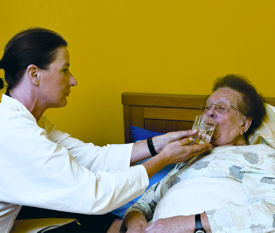In the News
Clinical updates from the reports compiled by ACP IntenristWeekly.
Afib studies examine development, prevention
Researchers have designed a risk score to help identify an individual's likelihood of developing atrial fibrillation, a Feb. 28 Lancet article said.

To create the score, researchers selected 4,764 Framingham Heart Study subjects age 45-95 years then monitored them for up to 10 years for a first atrial fibrillation event. They looked at characteristics like age, sex, alcohol consumption, body mass index (BMI), blood pressure, cholesterol levels, ECG features and indicators of heart disease, and performed a Cox regression analysis to assess which posed risks of atrial fibrillation.
During follow-up, 10% of participants developed atrial fibrillation. For men, there were 6.3 events per 1,000 age-adjusted person-years; for women, there were 3.3 events per 1,000 age-adjusted person-years. The predicted 10-year risk of atrial fibrillation was 2% for those with BMI at or greater than 30, 2% for those with systolic blood pressure at or greater than 160, and 2% for those being treated for hypertension. Also, the younger a person was when heart failure or significant cardiac murmur developed, the greater his or her risk of atrial fibrillation later.
The risk scoring system is based on clinical factors that are easy to measure in primary care, making it convenient for providers to use, the authors said. Those at high risk can be targeted for preventive measures. A limitation of the score, however, is that it was developed and validated with white, middle-aged-to-elderly subjects, so it may not generalize to young people or other ethnic groups, they said.
In other news, atrial fibrillation dramatically increases diabetic patients' risk of death, but that increase can be mitigated with blood-pressure medication, new data from the ADVANCE trial revealed.
The study included 11,140 patients with type 2 diabetes who were randomized to receive either a fixed combination of perindopril and indapamide or placebo. Measured outcomes included total mortality and cardiovascular disease outcomes over a four-year follow-up. Overall, patients with atrial fibrillation had a 61% increased risk of dying from any cause, 77% higher risk of death from cardiovascular causes, and a 68% higher risk of heart failure or other cerebrovascular problems.
Treatment with the blood-pressure medications reduced the risk of cardiovascular death by 18% and the all-cause risk of death by 14%. The reductions were similar in patients both with and without atrial fibrillation, but because the patients with atrial fibrillation had a higher baseline risk, a greater number were helped by the drugs. The researchers estimated that five years of active treatment would prevent one death for every 42 diabetic patients with atrial fibrillation and one for every 120 diabetics without.
The study authors noted that while rate and rhythm control is the usual therapeutic focus in patients with atrial fibrillation, this study indicates the importance of treating overall cardiovascular risk factors, such as blood pressure. Diabetic patients should be actively evaluated, an author said. The study was published by the European Heart Journal on March 11.
Medications don't help some heart failure patients
Common cardiac medications don't appear to improve the long-term survival of elderly patients with heart failure and preserved ejection fraction, a study found.
Researchers reviewed admission records of 142 patients age 80 years and older with heart failure and ejection fraction of 50% or greater. The mean age was 87 years, and 31% of patients were men. Medication status was determined from lists included in discharge records from a patient's first admission for heart failure. Researchers obtained mortality data from the Social Security death registry, and re-hospitalization data via chart review. The study is in the March 15 issue of the American Journal of Cardiology.
At five-year follow-up, 69% of patients had died; there was no significant difference in medication use between patients who died and survived. Medications used included beta-blockers, angiotensin-converting enzyme inhibitors/angiotensin II receptor blockers, calcium-channel blockers, diuretics, digoxin and statins. There were also no differences in gender, creatinine and co-morbidities (hypertension, diabetes, coronary artery disease, anemia) between survivors and those who died. There were trends toward a survival benefit with statins, and toward decreased survival with digoxin or diuretics, but these weren't significant. Medication use also didn't affect re-hospitalization, although patients using calcium-channel blockers had a significant increase in annual cardiac hospitalizations compared with those not taking them (2.7 ± 3.6 vs. 1.5 ± 2.5; P=0.045).
The study was retrospective and limited in its subject size, the authors noted. Researchers also couldn't verify whether patients were compliant with medication regimens, or whether those regimens changed during follow-up. Still, given the study findings of lack of benefit, cardiac drugs should be used cautiously in this population of octogenarians, particularly digoxin and diuretics, the authors said.
PPIs may weaken benefits of clopidogrel
Clopidogrel and proton pump inhibitors (PPIs) after acute coronary syndrome (ACS) may increase risk of death or readmission, leading some to suggest that it not be used for prophylaxis.
PPIs are frequently prescribed to reduce the risk of gastrointestinal tract bleeding from taking clopidogrel and aspirin. But studies have reported that omeprazole decreases clopidogrel's platelet inhibitory effect. Researchers did a retrospective cohort study of 8,205 ACS patients taking clopidogrel after discharge from 127 Veterans Affairs hospitals between Oct. 1, 2003, and Jan. 31, 2006. They reported results in the Journal of the American Medical Association.
Of the 8,205 patients, 63.9% were prescribed PPI in addition to clopidogrel at discharge, during follow-up, or both and 36.1% were prescribed clopidogrel only. Death or rehospitalization for ACS occurred in 20.8% (615) of patients taking clopidogrel without PPI and 29.8% (1,561) of patients combining them. The combination was associated with increased risk of death or rehospitalization for ACS compared with use of clopidogrel only and a higher risk for revascularization procedures, but no higher risk for all-cause mortality. The increased risk of adverse events observed with the concomitant use of clopidogrel and PPI was seen even after controlling for the use of aspirin, as well as after excluding patients with a history of gastrointestinal bleeding.
Randomized, controlled trials are needed, researchers wrote, because the “modest” risk seen in the study translates to a considerable number of people due to how frequently PPIs are prescribed to patients receiving dual-antiplatelet therapy. They added that PPIs should be used only for patients with a clear indication, such as a history of gastrointestinal tract bleeding, rather than for routine prophylaxis.



